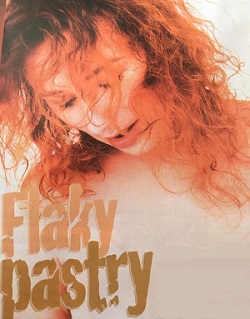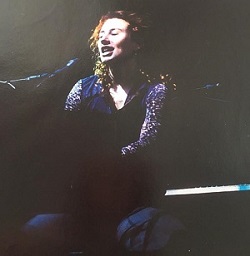|

songs | interviews | photos | tours | boots | press releases | timeline
Keyboard Review (UK)
April 1996

Flaky Pastry
It's not often that you meet a genuine original but that doesn't mean conversation's going to be easy. Beck Laxton translates Tori Amos...
I've been listening to Boys for Pele, Tori Amos' new
album, so much that it spools continuously inside my head, fragments of
different songs drifting in and out. At her record company's office I wait as
though for the dentist, before being ushered into a small dark room. I can't
believe I'm really about to meet the woman who's been there in my head for all
this time...
Tori is small but vivid, her hair the brightest thing in
the dim room. My hand shakes as I offer it. She sprawls in a sofa underneath
the window while I perch with my knees clasped together in a black leather
chair, feeling oddly English and uptight. It's too dark to see whether the
wheels of my tape recorder are going round, but the whole situation is so
dream-like that the idea of switching on a light simply doesn't occur to me.
I'm barely capable of asking a coherent question, so we kick off by talking
about the harpsichord, which she's used for the first time on the new album.
"It's something I played when I
was little," says Tori. "But I just didn't understand anything that didn't have
sustain. It's like a man without calves isn't it?" I'm confused already,
and we've hardly started. Calves?
"Oh boy!" says Tori, miming calves with enthusiasm.
This is obviously a fetish we don't share. She continues... "Sustain
is really a part of my sound - I use it a lot as a percussive instrument as
well as for the overhangs and just how I pedal."
"The idea of harpsichord entered
my mind a year ago, for a couple of reasons... I was really drawn to the
bloodline of womanhood. Mary Magdalene, the idea of the Magdalene having been a
blueprint; not the Virgin or the Divine Mother but woman - high
priestess, not just the chick that washed Jesus' feet with her tears. I've been
reading some books that figure she was a high-priestess in Jerusalem of the
Isis cult."
"It became a major journey, going
into the shadows and playing with those different sides of woman. That's so
much of whatever it sounds like - it's the diversity, the different rhythms,
the different tones of voices." Tori really does talk like this; her
conversation is famously elliptical, as steeped in metaphor as her song lyrics.
She doesn't tell you something and then offer an image to illustrate it: her
mind jumps straight to the image. This makes her hard work to translate
sometimes - it seems vulgar to try to pull her down to your own mundane level
of literalness - but it also makes what she says, and sings, extraordinarily
vivid. There again, some critics seemed to find Boys for Pele quite
incomprehensible. "It's a multi-layered work, and there are people that don't
get that impression," Tori agrees. "But I think
that's a reflection of them more than the work. I say: get a bottle of red and
lie down... you know, the head gets in the way. My head wasn't in the way when I was crawling on my knees trying
to find my womanhood. These are the things that I said when that phone wasn't
ringing; these are the things I wanted to say to men - this was my innermost
heart. And if it's 'You think I'm a queer' - well, I think you're a queer, I
think you're a queer, I think you're a queer!" Tori leans towards
me to hiss this, and I get the point - we're all weird in our own ways, and
who's to say she doesn't find me as weird as I find her? "It's all very
clear, really," she insists. "But if you don't
allow yourself to jump into the land of metaphor, then it won't make any sense
to you."
"Tuna/Rubber/A little blubber in
my igloo...' For me to say that line in another way would just make it really
gross and crass. Sometimes it's just about how something makes you feel.
You've got to go there, you've got to be willing to take that trip. And images,
tastes, smells, objects... it's associations. To me, these things are concrete.
Some were a little more layered than others, no question about that. But I
think from beginning to end it's about a woman's journey; and it's a really
emotional journey." Some of us heard the name of the album and thought
it was about football....
"Well, there are moments when it is
about football, of course!" Tori says, laughing. "But Pele is a volcano goddess, quite a strong force in Hawaii. She just
became a symbol for me, when I was crawling on my knees trying to find my fire,
my passion, as everything fell apart because of my separation [from the
producer of her first album, Eric Rosse]."
"When I was behind the piano I was
okay, but when I was away from that instrument I was totally out of my element:
I just shrivelled up, so that there was no woman, there was only a musician -
or nobody."
Tori's personality is part and parcel of her fame - that
famous kookiness that she's now expected to turn on like a tap. Does she feel
that she's selling that personality alongside the records?
"I'm not a victim to marketing.
Don't kid yourself:
There's no picture that goes out
that I can't live with.... I work with
Cindy Palmano, who's an amazing photographer; I want to portray certain things
visually, and we do. As far as how I'm perceived, that's one man staring at the
moon. I'm getting to a place where I've got to know how to live with that."
Tori takes issue with anyone who attacks her on personal
grounds.
"If somebody knows music, and
wants to go head to head with my work, I say go right ahead. But it's strange
when it gets personal. I don't know them! And when you've been playing since
before you could talk - you know, I was playing Mozart while some of these
critics were pissing on themselves in their beds! I want to know where this
meanness is coming from, because it's obviously not from my voicings - it's
usually from my lyrics, my personality, or my vibe, or they think I'm being
pretentious. No I'm actually just trying to explain what I was smelling when I
was getting defecated on, and instead of writing a song that says, 'well here I
am, dum-di-di-dee, getting defecated on, dum-di-di-dee, doesn't smell sweet,
dum-di-di-dee, I think I'll go wee' - you know? Cute, but there's no romance in
there."
"The funny thing is that things
never get vicious with the real musicians; it's the ones who are resentful that
they haven't taken their music that far. Real musicians, the real McCoys just
aren't vicious with each other. You know, something Keith Jarrett does might
not be my cup of tea, but so what! I might prefer sweet potatoes any day, but
there's a level where I can acknowledge what that is, because I know."
"Music matters to a lot of people
out there. You need a good record, a record that takes you places. You want to
go on that journey, and at the end think 'That wasn't the kind of trip I was
expecting, but it was a valid one'. If you like sweet potatoes, right. But if
you don't like sweet potatoes, it's still a sweet potato. Some people just
can't say, 'I don't like sweet potatoes, personally'. And musicians have to be
clear on that: you can't be pizza, and great tart, and sweet potato - you can't
be everything."
"What I'm interested in,
loneliness and doubt and all those feelings - they're geographical. There's a
place where that lives in each being. And it depends what circumstances you run
across in your life whether they take you there or not. That's the journey,
whatever it took for the eye to see, what was in the heart. I'm showing you the
woman both ways: desperation - the absolute obsession, worship - and then at
the other end of just disgust. That's what I felt coming through when I sang
them; I let myself go there. But some people don't want to take that ride -
it's not for everybody."
"It's a record where a lot of
thought got exchanged, stolen, thrown back in your face. I wouldn't really call
it a party record. It might have a lot of fun on it, but it's definitely got a
lot of that vampire feeding energy, domination of each other, and you've got to
descend with it before you can ascend. I think you can enjoy it without having
to figure out every word, but unless you know that that's the thread... you
know, this is not a vegetarian record. It's medium rare. And some people don't
eat meat. When I sing, especially with this album, it's uncensored. A lot of
the songs were finished in the recording. I had bits of paper hanging up so I
could remember the words and I was just going after them, in that moment."
"I hoped this record would be in
the present tense, so when you're listening to it, I'm not singing about
something that happened in the past. It's happening in that moment, the
revelation of things as they're coming. The argument as it's happening. The
desire to drag him and just destroy him as it's happening. Not 'let me write a
song about what it would be like to destroy...' Wrong!"
"It's about the feminine side,
whether you're male or female. If you're really open to the emotional bond,
then you can go traveling there. If you've crawled, and you allow yourself to
remember that you've crawled, or that you watched your lover crawl... You know,
men in hetero relationships rarely know what happens when they put down that phone
and say 'Look, now's not a good time'. No, now is the time. How many times have
you gone on trying to keep things on an even keel instead of saying, Wrong, I'm
doing something to you: I'm poisoning your muffins?"
"Any kind of relationship that's
just based on functionalism I'm not interested in. For me the real giggles come
out of tragedy. I'll have slapstick for five minutes when I'm bored, but
there's black comedies where I live. There are moments when I was just laughing my ass off. How can you not? We're all gross, if we're honest. And you know, Amen for the truth."

 
[scans by Lori Christie]
t o r i p h o r i a
tori amos digital archive
yessaid.com
|